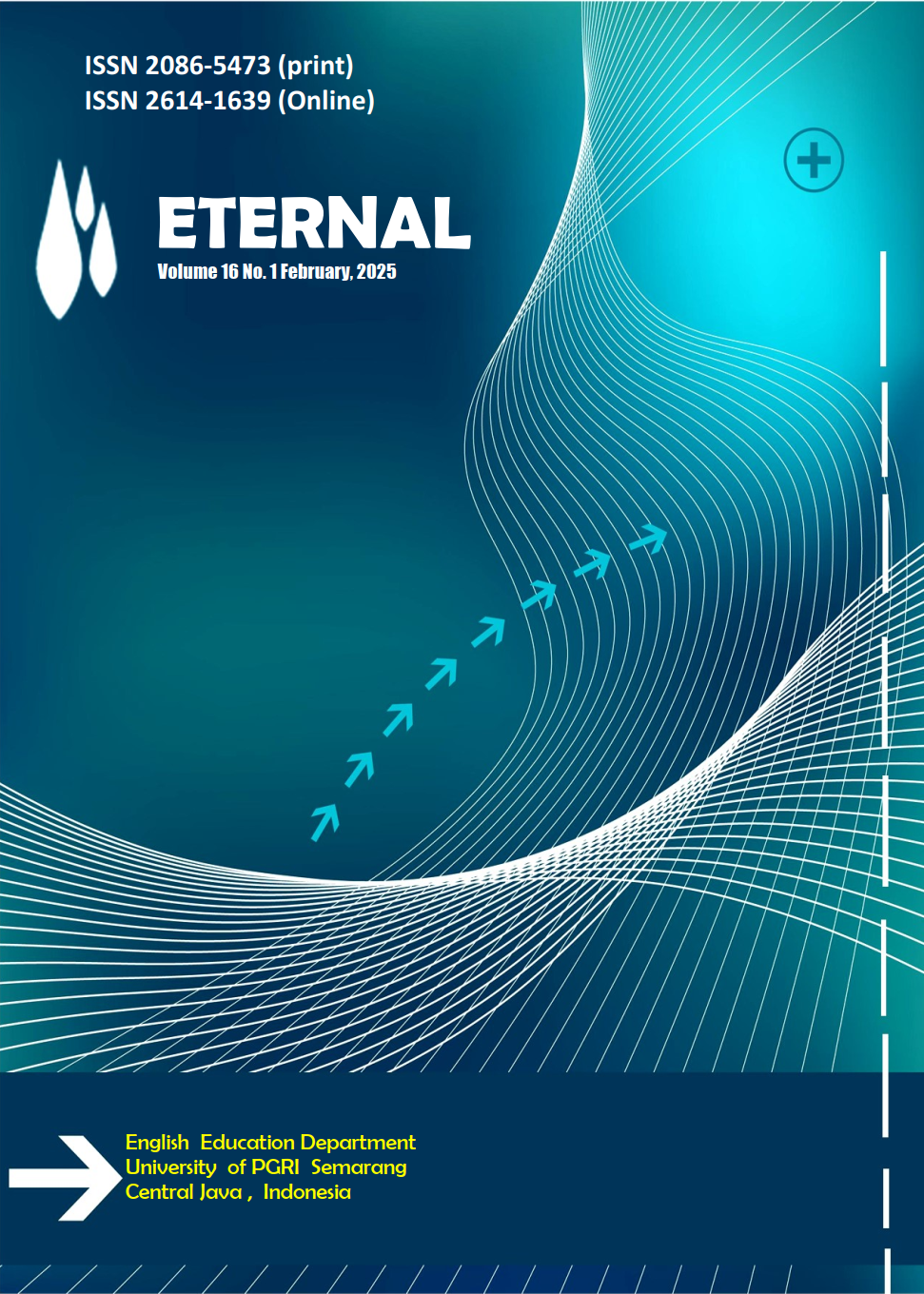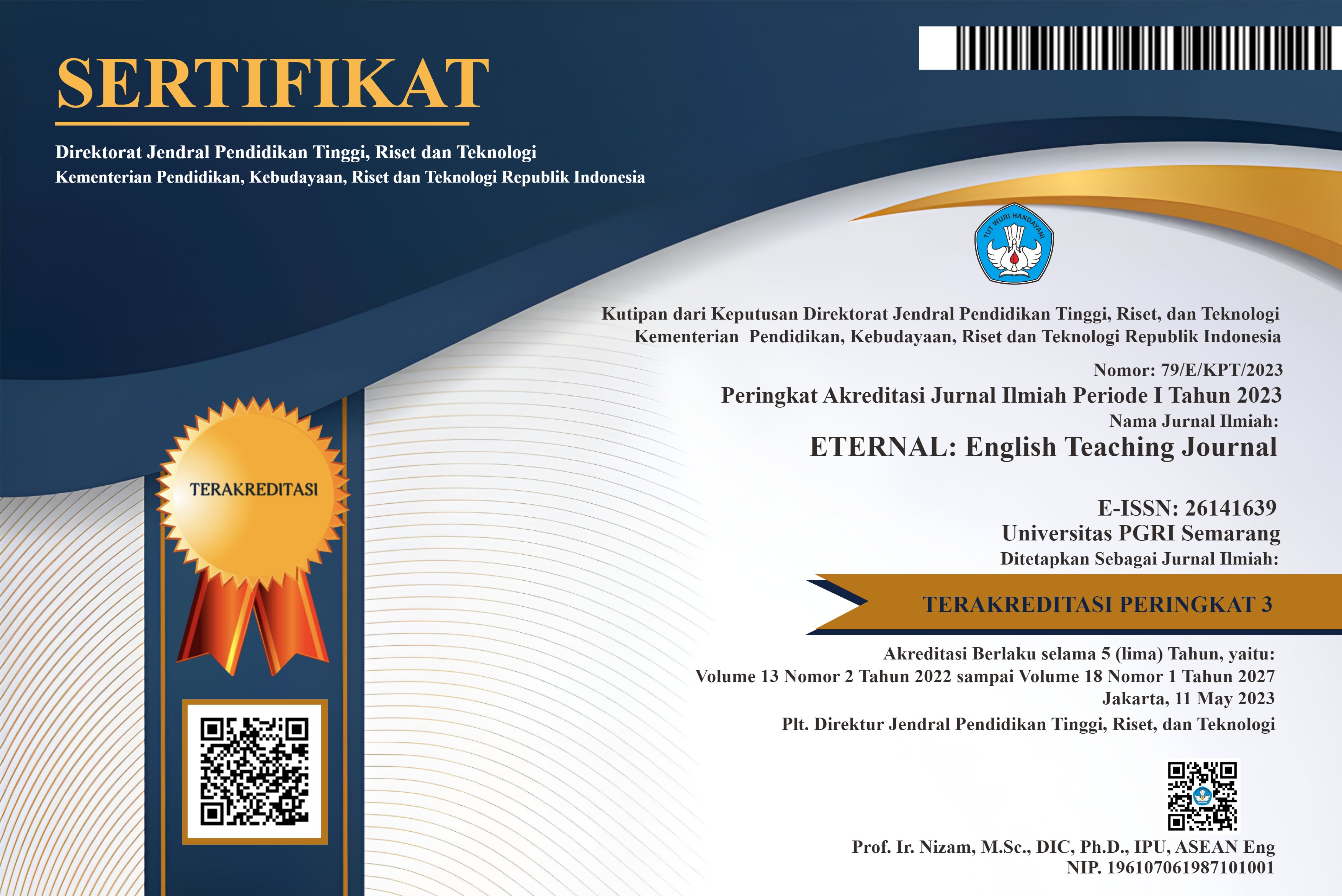Exploring the Use of Google Docs for Collaborative Narrative Writing: A Sequential Exploratory Study in EFL Classroom
DOI:
https://doi.org/10.26877/eternal.v16i2.1543Keywords:
Google Docs, EFL Classes, Collaborative Writing, Narrative TextAbstract
Abstract. Among the recent technological tools often used in teaching English as a foreign language (TEFL), Google Docs is mostly used. This online media facilitates students' collaborative writing activities, making Google Docs frequently applied in writing classes to construct narrative text. Therefore, this study explores the influence of Google Docs as a medium for collaborative writing among EFL students in higher education, specifically on how it fosters sstudents' collaboration, communication, critical thinking, and creativity as part of 21st-century skills. Through a mixed-method study, the research examines how students perceive Google Docs as it is employed to support collaborative writing. Data were collected from 50 English literature students from a private university in Indonesia. They were asked to describe their experiences in learning diaries throughout the teaching-learning session before being interviewed and asked to answer a questionnaire at the end of the course. The findings indicated that Google Docs provided students with meaningful learning experiences. It facilitates real-time collaboration and enhances peer feedback, which makes the activities beneficial in developing students' collaboration, communication, critical thinking, and creativity as part of 21st-century skills. Therefore, the study emphasizes the need for structured guidance to maximize ICT tools' usefulness for education.
References
Alwahoub, H. M., Jomaa, N. J., & Azmi, M. N. L. (2022). The impact of synchronous collaborative writing and Google Docs collaborative features on enhancing students’ individual writing performance. Indonesian Journal of Applied Linguistics, 12(1), 113–125. https://doi.org/10.17509/ijal.v12i1.46541
Astuty, T., Sembiring, B., Bengkulu, U. D., Sembiring, S., & Semarang, U. N. (2024). Practical Application of Assessment Theories for English Teacher through Digital Technologies. 15(2), 378–387.
Bereczki, E. O., & Kárpáti, A. (2021). Technology-enhanced creativity: A multiple case study of digital technology-integration expert teachers’ beliefs and practices. Thinking Skills and Creativity, 39(November 2020). https://doi.org/10.1016/j.tsc.2021.100791
Cahyani, I., Nurhadi, J., & Mentari. (2023). Enhancing writing skills and language creativity through the plus-minus-interesting technique: A case study at the primary school level. Indonesian Journal of Applied Linguistics, 13(1), 63–71. https://doi.org/10.17509/ijal.v13i1.58257
Creswell, J. W., & Plano Clark, V. L. (2023). Revisiting mixed methods research designs twenty years later. Handbook of Mixed Methods Research Designs, 21–36.
Fitria, R., Trisnawati, I. K., & Mulyani, M. (2023). What Indonesian EFL Learners Perceive of Collaborative Writing: Experience in Writing Essays Online. English Education Journal, 14(1), 493–516. https://doi.org/10.24815/eej.v14i1.29227
Herman, H., Rafiek, M., Agustina, T., Saddhono, K., Malabar, S., Saputra, N., & Purba, R. (2023). Exploring the metafunctions to improve EFL learners’ writing ability in the perspective of systemic functional linguistics. Research Journal in Advanced Humanities, 4(2), 87–100. https://doi.org/10.58256/rjah.v4i2.1195
Indah, R. N., Toyyibah, Budhiningrum, A. S., & Afifi, N. (2022). The Research Competence, Critical Thinking Skills and Digital Literacy of Indonesian EFL Students. Journal of Language Teaching and Research, 13(2), 315–324. https://doi.org/10.17507/jltr.1302.11
Jubhari, Y., Sasabone, L., & Nurliah, N. (2022). The Effectiveness of Contextual Teaching and Learning Approach in Enhancing Indonesian EFL Secondary Learners’ Narrative Writing Skill. REiLA : Journal of Research and Innovation in Language, 4(1), 54–66. https://doi.org/10.31849/reila.v4i1.8633
Kurniasih, Cahyono, B. Y., Astuti, U. P., & Suryati, N. (2022). Online Writing Instruction in Indonesıa: Causes of Anxiety Problems and Strategies of Solutions. Pegem Egitim ve Ogretim Dergisi, 13(1), 31–40. https://doi.org/10.47750/pegegog.13.01.04
Lingard, L. (2021). Collaborative writing: Strategies and activities for writing productively together. Perspectives on Medical Education, 10(3), 163–166. https://doi.org/10.1007/s40037-021-00668-7
Marwa, M., Nurfaisal, N., Mualiardi, M., Awal, R., & Irawan, H. (2024). Enhancing 21st Century Skills in the EFL Classroom: Exploring Teachers’ Implementation of Group Activities and Assignments. AL-ISHLAH: Jurnal Pendidikan, 16(2), 1740–1756. https://doi.org/10.35445/alishlah.v16i2.5355
Nabhan, S., & Sa’diyah, H. (2021). Collaborative Writing Using Google Docs in an EFL Classroom: Voices from High School Students. VELES Voices of English Language Education Society, 5(2), 156–166. https://doi.org/10.29408/veles.v5i2.3863
Nayman, H., & Bavlı, B. (2022). Online Teaching of Productive Language Skills (PLS) during Emergency Remote Teaching (ERT) in EFL Classrooms: A Phenomenological Inquiry. International Journal of Education and Literacy Studies, 10(1), 179. https://doi.org/10.7575/aiac.ijels.v.10n.1p.179
Pham, V. P. H. (2021). The Effects of Collaborative Writing on Students’ Writing Fluency: An Efficient Framework for Collaborative Writing. SAGE Open, 11(1). https://doi.org/10.1177/2158244021998363
Qureshi, M. A., Khaskheli, A., Qureshi, J. A., Raza, S. A., & Yousufi, S. Q. (2023). Factors affecting students’ learning performance through collaborative learning and engagement. Interactive Learning Environments, 31(4), 2371–2391. https://doi.org/10.1080/10494820.2021.1884886
Ratama, I. P., Padmadewi, N. N., & Artini, L. P. (2021). Teaching the 21st Century Skills (4Cs) in English Literacy Activities. Journal of Education Research and Evaluation, 5(2), 223. https://doi.org/10.23887/jere.v5i2.30849
Rofi’, A., Siska, W., Yunus, N., Purnama, Y. K. H., Saifuddin, Z., & Purwokerto, I. (2024). Information And Communication Technology (ICT) Integration in The Teaching of English: A Systematic Review. International Journal of Teaching and Learning (INJOTEL), 2(3), 782–794.
Saimon, M., Lavicza, Z., & Dana-Picard, T. (Noah). (2023). Enhancing the 4Cs among college students of a communication skills course in Tanzania through a project-based learning model. Education and Information Technologies, 28(6), 6269–6285. https://doi.org/10.1007/s10639-022-11406-9
Tasri, M. F. (2021). The Effect of Online Collaborative Writing through Edmodo on Students’ Writing Skill at MA Masyhudiyah Giri. Journal of English Teaching, Literature, and Applied Linguistics, 4(1), 6. https://doi.org/10.30587/jetlal.v4i1.2299
Wang, S., Sun, Z., & Chen, Y. (2023). Effects of higher education institutes’ artificial intelligence capability on students’ self-efficacy, creativity and learning performance. Education and Information Technologies, 28(5), 4919–4939. https://doi.org/10.1007/s10639-022-11338-4
Yulianawati, I., Saleh, M., Mujiyanto, J., & Sutopo, D. (2022). The Effectiveness of Writing Techniques in Improving Students’ Writing Ability with Different Self-Esteem. Studies in English Language and Education, 9(1), 30–44. https://doi.org/10.24815/siele.v9i1.21725







